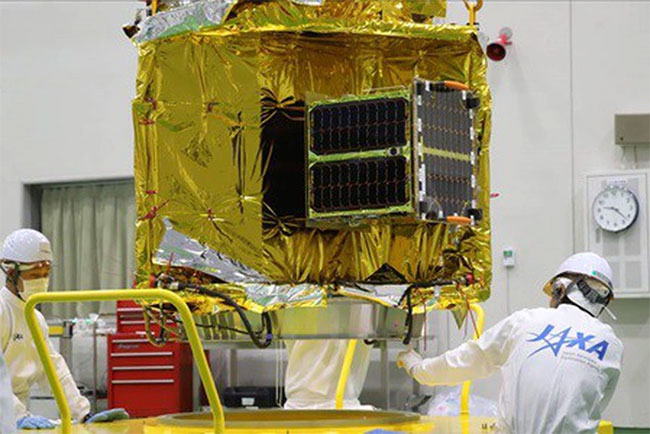The Japan International Cooperation Agency (JICA) announced on May 25 that on May 23, it signed an agreement with the Government of Vietnam for a loan of 18.871 billion yen (nearly 19 billion yen) for the Disaster Prevention and Climate Change Project using Earth Observation Satellites (Phase II).
The loan period is 40 years, with a grace period of 10 years. The bidding condition stipulates that a Japanese company will be the main contractor. The implementing agency is the Vietnam National Space Center – Vietnam Academy of Science and Technology. The first satellite is expected to be successfully launched into orbit by December 2023.

Engineers from the Japan Aerospace Exploration Agency (JAXA) are testing the installation of the MicroDragon satellite, the first satellite produced by Vietnam, into the payload compartment of the Epsilon rocket No. 4 in August 2018. (Photo: JAXA)
The project will provide essential equipment for the development and use of Earth observation satellites in Hoa Lac, Hanoi, promote the utilization of data obtained from satellites, and support capacity building for the operational and maintenance staff of the equipment. Through these supports, the project aims to mitigate disaster risks in Vietnam by enhancing disaster response measures and establishing various plans based on forecasts of increasing levels of natural disasters caused by climate change.
The ODA loan for Phase I, valued at 7.227 billion yen, was approved in November 2011, and this loan agreement is for the ODA Phase II.
Special terms for Special Terms for Economic Partnership (STEP) apply to this ODA loan project. The project will utilize Japan’s synthetic aperture radar satellite technology, which is cost-effective, high-performance, compact, and capable of delivering satellite images in a short time. This technology will contribute to the development of the operational system and the satellites equipped in the project, along with the launch of Earth observation satellites.
|
STEP stands for “Special Terms for Economic Partnership”. This term applies to projects that significantly leverage Japanese technology and technical expertise based on the requests of developing countries for the use and transfer of advanced Japanese technologies. The basic condition of the STEP loan is that the main contractor will be a Japanese company, or a branch of a Japanese company abroad, or a joint venture between a Japanese company and a Vietnamese company (with the Japanese company leading the joint venture), whereby the Vietnamese company can participate as a member of the Japan-Vietnam joint venture or as a subcontractor. Under certain conditions, a joint venture between a Japanese company and a company with Japanese ownership (with the Japanese company leading the joint venture) can also be the main contractor. |


















































